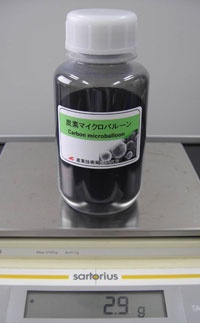Mar 3 2009
Katsumi Kamegawa, the Biomass Refining Technology Team, the Biomass Technology Research Center of the National Institute of Advanced Industrial Science and Technology (AIST), has developed a new method for producing ultra-lightweight hollow carbon fine particles (diameters ranging from several nanometers to several tens of micrometers) from lignin, which is a byproduct obtained in large quantities during the manufacture of paper or bio-ethanol, and inorganic salts.

Global warming and depletion of oil reserves are issues of global concern; hence, it is desirable to use biological resources in place of fossil resources such as oil. It is noteworthy that almost 7 million tons of lignin, which is a biological resource (biomass), is produced as a byproduct of paper manufacturing in Japan every year, and is generally burnt as waste.
In the method developed in this study, lignin is mixed with an inorganic salt to form a complex; this complex is then pyrolyzed at 600 - 800°C, washed, and finally dried to yield sub-micrometer-sized hollow carbon particles or nanometer-sized hollow carbon particles whose diameters are in the range of 3–30 nm. The sample in the 200-mL container is extremely light, and weighs less than 3 g, as shown in the photograph.
Rubber or plastics can be reinforced by these particles, instead of carbon black, and would be lightweight materials with improved properties.
The details of this method will be exhibited at "nano tech 2009," which will be held at Tokyo Big Sight on February 18–20, 2009.